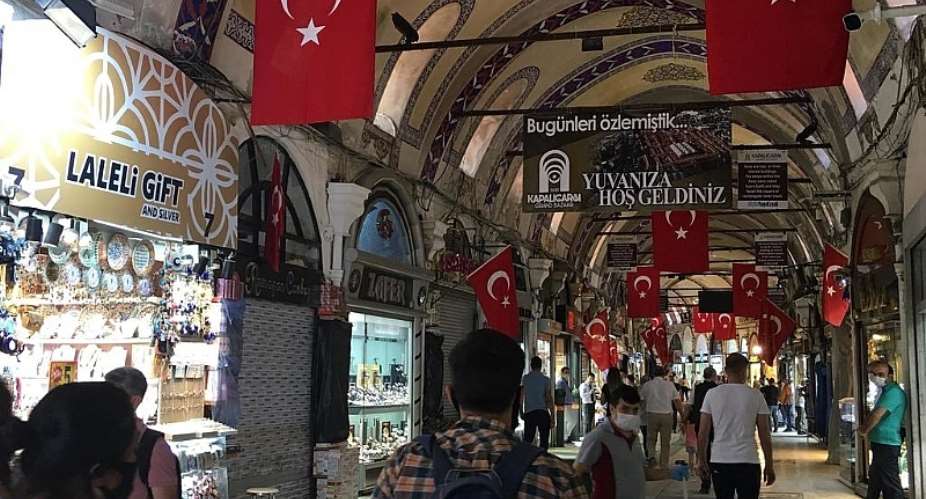Turkey claims to have one of Europe's lowest Covid-19 mortality rates. The Turkish government is, as a result, rapidly easing restrictions. The reopening of Istanbul's world-famous Grand Bazaar is one of the most dramatic signs of the country's determination to get back to business.
The ancient green doors of the Grand Bazaar, which have welcomed customers for over five hundred years, are again open after 70 days of closure.
"Believe me, it was tough," said Fatih Kurtulmus, the Chairman of the Grand Bazaar board. "Thank God we've now returned to our second home. For us, health is a priority, then comes security, and then the economy."
Stringent health checks are in force. Everyone entering the five-hundred-year-old bazaar now has their temperatures checked.
Public announcements, along with signs, inform visitors of the need to maintain social distancing and wear masks.
Short of the usual 150,000 shoppers
People are returning, albeit well short of the usual 150,000 daily shoppers.
"I've lived in Istanbul for a long time and have never experienced the Grand Bazaar being closed," said Dr. Muge Komurcuoglu with shopping bags in hand.
"Its reopening is a really good thing. As a doctor, I am more aware of the risks. But as long as you wash your hands and wear a mask, there's no problem."
Komurcuoglu said her bazaar visit was possible as infection and mortality rates have markedly fallen, easing pressure on health workers.
Turkish death-rate remarkably low
According to the US-based John Hopkins University, which monitors the Covid epidemic, Turkey has a 2.6 percent mortality rate. Germany, widely considered among the most successful in fighting the virus, has a 4.6 percent death rate.
"The most important point in our success has been reducing the need for intensive care," said Dr. Mesut Sonmez, head physician at Istanbul's Sultangazi Haseki Hospital.
"This became possible with our early start of the treatment and giving the necessary treatment and support to the patients on time."
Sultangazi Hospital treated the first Covid-19 patients, 20,000 patients later, only a handful remain.
"We're the victors in this war - at least for now, we're ahead, one-nil," says head nurse of intensive care, Merve Altinkaya.
"We're much better off now as our cases have declined, which means more motivation, shorter working hours, and less tiredness," she added.
Massive investment in health
Sultangazi is among many new state hospitals built as part of the government's massive investment in health. A similar recent expansion in private hospitals, ensured that Istanbul, the epicenter of Covid-19, wasn't overwhelmed by the pandemic.
Turkey's young population is also cited as a factor in the country's relatively low death rate, since young people are less vulnerable to the virus. Also, elderly people in Turkey are usually cared for in the community rather than in nursing homes, which were a hotspot in other countries for Covid-19 related deaths.
Tourism sector suffering
Ankara is now lobbying hard for the European Union to lift travel restrictions. Tourism is vital part of the Turkish economy, accounting for over 10 percent of GDP.
At Istanbul's Bazaar, tourists account for around half of the money taken in by the 4000 shops. For sellers of Turkey's world-famous carpets, the figure rises to over 90 percent, according to rug seller Hasan Can.
"We close early because there is nobody. There are no people because our business is mostly with tourists," said Can. "We are just coming to kill time. We have hope it's going to be good. I hope it gets really better."
But Ankara's easing of controls in its bid to revive the economy, with the message open for business and tourism, is causing growing unease among the medical community.
"Until a vaccine and treatment are found or unless it mutates, this virus will always be in our lives, it's an invisible threat. It's in our hands, in our society's hands, not to turn this optimistic picture into a pessimistic one," warns Dr. Mesut Sonmez.





 Ejisu by-election: Aduomi warns NPP against voter intimidation
Ejisu by-election: Aduomi warns NPP against voter intimidation
 High Court orders implicated four NDA officials to present defence
High Court orders implicated four NDA officials to present defence
 Let’s all be matured, patriotic to have a peaceful election this year – Dampare ...
Let’s all be matured, patriotic to have a peaceful election this year – Dampare ...
 Mahama's administration saw thievery that knew no bounds; stole from market wome...
Mahama's administration saw thievery that knew no bounds; stole from market wome...
 GRA/SML deal: Always read the stories behind the headlines or you'd look stupid ...
GRA/SML deal: Always read the stories behind the headlines or you'd look stupid ...
 GRA/SML Contract: It takes some 'wild' boldness for a president to make this dec...
GRA/SML Contract: It takes some 'wild' boldness for a president to make this dec...
 Elisu By-election: "If you call yourself a man, boo Chairman Wontumi again" — Bo...
Elisu By-election: "If you call yourself a man, boo Chairman Wontumi again" — Bo...
 Fuel tanker driver escapes with his life after tanker goes up in flames near Suh...
Fuel tanker driver escapes with his life after tanker goes up in flames near Suh...
 Uniform change: ‘Blue and white are brighter colours’ — Kwasi Kwarteng explains ...
Uniform change: ‘Blue and white are brighter colours’ — Kwasi Kwarteng explains ...
 MoE not changing all public basic school uniforms but only newly built ones — Kw...
MoE not changing all public basic school uniforms but only newly built ones — Kw...
